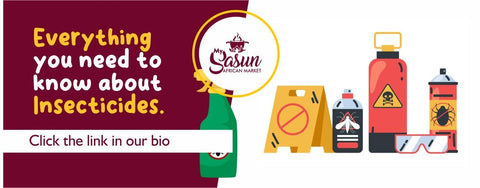One of the things that Africans detest is finding insects playing around in their homes. Some people have a strong hatred for insects. Some other people have a form of phobia for them. A few other people are simply indifferent about them until they are destructive.
Whichever category you fall into, I am sure that nobody wants to come back home to find roaches in their food or ants in their clothes.
READ WHAT YOU SHOULD KNOW ABOUT BIRD FLU AND ITS PRECAUTIONS

Thanks to science and innovations, we have insecticides that have been created specifically to deal with these insects. Insecticides are products that are designed to control or kill insects in and around the home. They are available in various forms such as sprays, baits, traps, and foggers, and are widely used to control common household pests such as cockroaches, ants, spiders, and flies.
In this blog post, we will discuss the different types of household insecticides, their benefits and risks, and best practices for their use.
Types of Household Insecticides
-
Contact Insecticides: Contact insecticides work by killing insects on contact. They are available in aerosol sprays, pump sprays, and dusts, and can be used to target specific insects. We have contact insecticides in our store. Raid is a contact insecticide as well as a residual one. Sniper is also a contact insecticide.
-
Residual Insecticides: Residual insecticides are applied as a liquid or spray and remain active for several weeks, providing long-lasting protection against insects. They are commonly used to control ants, cockroaches, and other crawling insects.
-
Baits: Baits are an effective way to control insects that are attracted to food, such as ants and cockroaches. They contain a poison that is mixed with an attractant, and once ingested, the insect will die.
-
Traps: Traps are designed to capture and kill insects, such as flies and mosquitoes. They use a sticky surface or an attractant to lure insects into the trap, where they are unable to escape.

Benefits of Household Insecticides
The use of household insecticides can offer several benefits, including:
-
Protection against disease: Insects such as mosquitoes and ticks can carry disease, and the use of insecticides can help prevent the spread of these diseases.
-
Increased comfort: Insecticides can help control the population of annoying and harmful insects, providing increased comfort and quality of life in the home. Many of us can relate to the annoying sound that mosquitoes make. Eradicating them definitely takes that noise away
-
Prevention of property damage: Insects such as termites and carpenter ants can cause significant damage to wooden structures in the home, and the use of insecticides can help prevent this damage.
Risks of Household Insecticides
-
Toxicity: Insecticides contain toxic chemicals that can be harmful to humans and pets if used improperly. It is important to carefully read and follow the instructions on the label before using any insecticide. Also, insecticides should not be kept within the reach of children. A product like sniper is extremely toxic to consume and should be out of children's reach.
-
Environmental impact: Insecticides can be harmful to the environment, particularly if they are not used properly. They can contaminate water sources, harm beneficial insects, and contribute to the development of resistant strains of insects.
READ THE DYNAMICS OF SHOPPING EXPERIENCES
Best Practices for Using Household Insecticides
-
Read and follow the instructions on the label carefully before using any insecticide.
-
Choose the right type of insecticide for the pest you are targeting.
-
Use insecticides sparingly and only as directed.
-
Store insecticides in a safe place out of the reach of children and pets.
-
Dispose of empty insecticide containers properly. Don’t consider using empty insecticide containers for other purposes.
In conclusion, household insecticides are a useful tool for controlling pests in and around the home. However, they should be used with caution and in accordance with the instructions on the label to minimize any potential risks. It is important to consider non-toxic or less toxic alternatives before using insecticides and to properly dispose of empty containers to reduce the impact on the environment.







Comments (2)
Am here to let the whole world know that I was diagnose of herpes 3 years ago where all hope was lost and I had nothing to do about it,I just accepted the faith that one day I will cure of this disease and I just pray everyday for a helper and one day my sister introduce me to a herbal doctor man called Dr ahonsie that she saw him on internet well I contact him on his email,I was not fully convinced until he sent me the herbal medicine which he ask me to take for two weeks I took it with faith and i went for a retest in different hospitals and today am cured of this disease and am also using this medium to let all those having STD,like herpes and the rest not to give up,their is a man who can cure you,his name is Dr ahonsie . contact the great herbalist via his Email: drahonsie00@gmail.com / WhatsApp: +2348039482367. https://drahonsie002.wixsite.com/dr-ahonsie
I thought the physicians says there is no cure for HSV 2!!! I am telling you today that Dr ahonsie cure HSV 2 with his herbal medicine and once you get cured you are cured forever it is never reversible, I have been suffering for this deadly disease called h HSV 2 for more than a 2years and lost all hope because my doctor says there is no cure for HSV 2. Brethren I saw a testimony on the internet on how Dr ahonsie cure HSV, Hapatitis etc with his herbal medication and an email and watsapp to contact him was also displayed, I thought this was joke but I decided to contact him and he replied telling me not to worry that my problem is over . Dr ahonsie sent me a herbal medication to drink for one month but only 2weeks I feel strange and I went to my doctor and he confirmed me negative. He can help you too. Contact him drahonsie00@gmail.com or whatsapp +2348039482367 https://drahonsie002.wixsite.com/dr-ahonsie https://www.facebook.com/drstellaherbalhome?mibextid=ZbWKwL